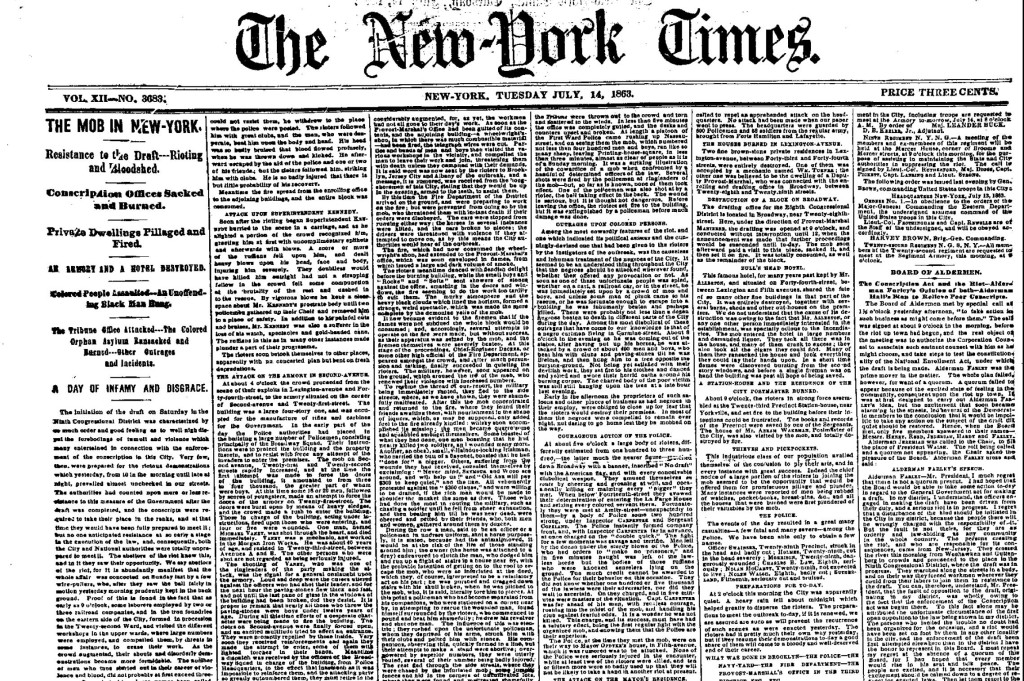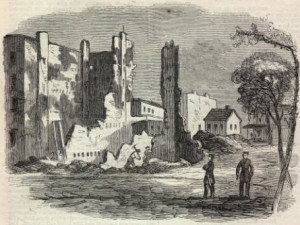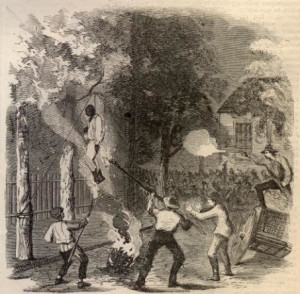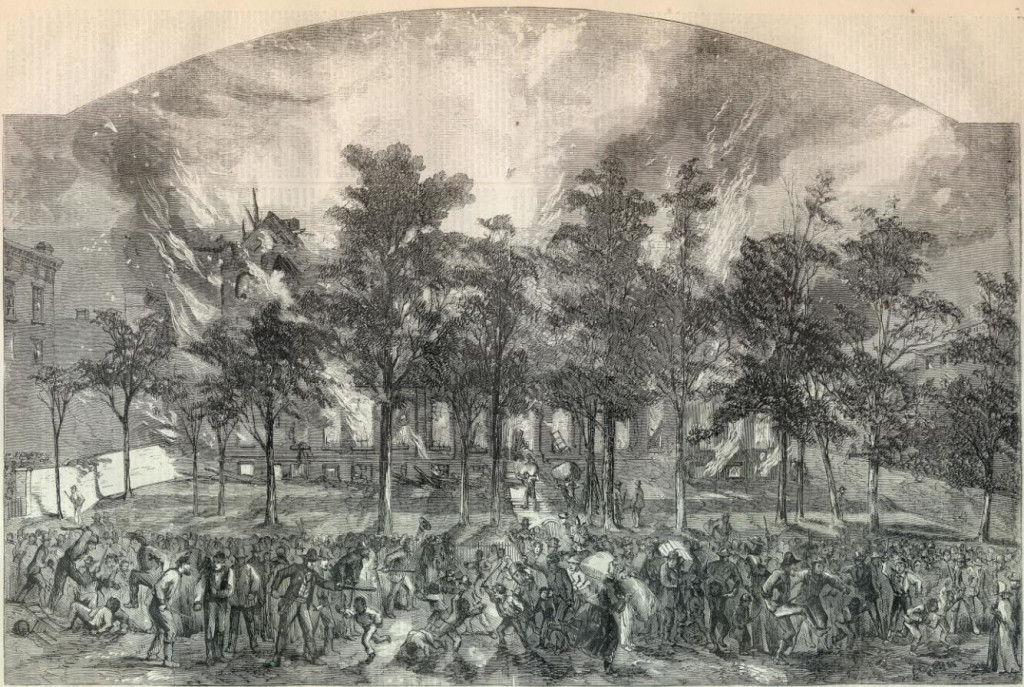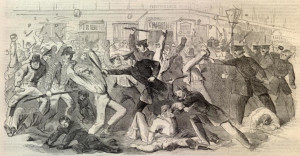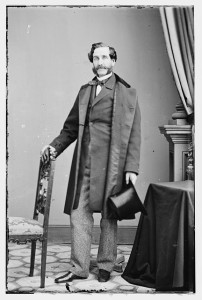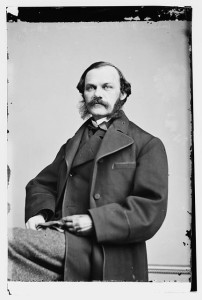150 years ago today riots broke out in New York City. The immediate cause was the commencement of the draft in New York Congressional districts. As James McPerson [1] pointed out, most of the New York militia and federal troops were away from the city because of the Gettysburg campaign. In a July 4th speech in the city Democrat governor Horatio Seymour “warned Republicans who pleaded military necessity for emancipation and conscription: ‘Remember this – that the bloody and treasonable doctrine of public necessity can be proclaimed by a mob as well as by a government.'” McPherson mentioned a longshoreman strike “in June 1863 when black stevedores under police protection took the place of striking Irishman.”- who for the most part lived in tenements and worked at low wage jobs and feared black competition. One target was the Republican Tribune. “Henry Raymond of the Times borrowed three recently invented Gatling guns from the army to defend his building.”
You can read a full account of the July 13, 1863 draft riot at The New-York Times of July 14, 1863:
THE MOB IN NEW-YORK.; Resistance to the Draft–Rioting and Bloodshed. Conscription Offices Sacked and Burned. Private Dwellings Pillaged and Fired. An ARMORY AND A HOTEL DESTROYED. Colored people Assaulted–An Unoffending Black Man Hung.The Tribune office Attacked–The Colored Orphan Asylum Ransacked and Burned–Other Outrages and Incidents.A DAY OF INFAMY AND DISGRACE. ATTACK UPON SUPERINTENDENT KENNEDY. THE ATTACK ON THE ARMORY IN SECOND-AVENUE. SCENES BY AN EYE-WITNESS. BURNING OF THE ORPHAN ASYLUM FOR COLORED CHILDREN. ATTACK ON THE TRIBUNE OFFICE. OUTRAGES UPON COLORED PERSONS. COURAGEOUS ACTION OF THE POLICE. THE ATTACK ON THE MAYOR’S RESIDENCE. MEETING OF EX-OFFICERS AT THE ARMORY OF THE SEVENTH REGIMENT. CHARACTER OF THE MOB. ROVING RIOTERS. APPREHENDED ATTACK ON THE POLICE HEADQUARTERS. THE HOUSES BURNED IN LEXINGTON-AVENUE. DESTRUCTION OF A BLOCK ON BROADWAY. BULL’S HEAD HOTEL. A STATION-HOUSE AND THE RESIDENCE OF THE CITY POSTMASTER BURNED. THIEVES AND PICKPOCKETS. THE POLICE. PREPARATIONS FOR TO-DAY. …
Here are a couple editorials.
From The New-York Times July 14, 1863:
Shall Ruffians Rule Us?
The mob yesterday was unquestionably started on the basis of resistance to the draft. But that was a very small part of the spirit which really prompted and kept it in motion. It was, probably, in point of character the lowest and most ruffianly mob which ever disgraced our City. Arson, theft and cowardly ferocity seemed to be the animating impulse of a very large portion of the mass that composed it. We have never witnessed a more disgusting or more humiliating sight than was offered in every street which these gangs of outlaws tramped through with their hideous uproar. A large portion of them were mere boys, and their special delight seemed to be to hunt negroes. One would have supposed that every colored man, woman and child must be a wild beast — to judge from the savage and eager delight with which they were chased and beaten and stoned by these wretched brutes in human form. It seems inconceivable that so much of pure, unadulterated ferocity — so much of that clear, undiluted cruelty which feels a keen and ecstatic relish in the infliction of torture upon others for its own sake, can dwell in the human heart. But such hideous outbreaks as that of yesterday draw aside the curtain and show us how much of the wild beast, in spite of our better qualities, really belongs to the baser elements of our social life.
There is but one way to deal with this coarse brutality. It is idle to reason with it, — worse than idle to tamper with it; it must be crushed. Nothing but force can deal with its open manifestations. Unless this City is to be surrendered to the most lawless and reckless of mob rule, this riot which broke out yesterday, and which, beyond all question, will renew its outrages, must be put down by force. If it is paltered with, it will gain the upper hand, and then we might better live among savages than under the ruffians who will rule and plunder us at their pleasure.
Our City authorities owe it to themselves and to the people to suppress this mob. We have full faith that they will act with vigor and decision. Our Police Department has already earned high praise by the courage and efficiency with which it met the crisis. Mayor OPDYKE will do everything in his power to preserve the public peace; but, unless he resorts to the exercise of something more than the ordinary powers which belong to his office, unless he calls into active exercise the special force which stands ready instantly to respond to his summons, there is but little that he can do toward crushing the mob. We have a right, too, to look to the State and General Governments for whatever they can do for the restoration of the public peace. It behooves all our authorities and all our citizens, without regard to political opinions or to party differences, to rally to the support of Law and Order. Whatever else may happen, this City must not be disgraced by falling into the hands, even for a day, of such brutal ruffianism as raged yesterday, almost without control, through our streets. Let every man see to it that he does everything in his power to avert so fearful a catastrophe.
From The New-York Times July 14, 1863:
THE MOB AND THE PRESS.–The mob last
evening broke the windows and demolished the furniture in the counting-room of the Tribune, and attempted to crown their infamous and fiendish ruffianism by setting the building on fire. The prompt arrival and vigorous action of a body of Police interrupted their proceedings, and deprived them of the pleasure of being as brutal as they had hoped and expected to be.
We have not always agreed with our neighbor on political topics, and have not deemed it wise on grounds of the public welfare to make Slavery and the negro so prominent in these discussions as the Tribune has done. But that is a matter concerning which judgments and tastes may differ. It is intolerable that a mob should undertake by violence and destruction of property to dictate topics for public discussion, or to control the sentiments and utterances of the public Press. When such an issue is forced upon journalists, they must make it their common cause.
We regret that the Tribune should have suffered in such a shape even the trifling loss which last night’s mob inflicted upon them. They had the aid of some among our employes in protecting their property, and shall have it again whenever the invidious favor of the mob shall again release us from the necessity of defending our own.
______________________________________________
All the riot-related images were published in the August 1, 1863 issue of Harper’s Weekly hosted at Son of the South
- [1]McPherson, James M. The Battle Cry of Freedom: The Civil War Era. New York: Ballantine Books, 1989. Print. page 609-611.↩

